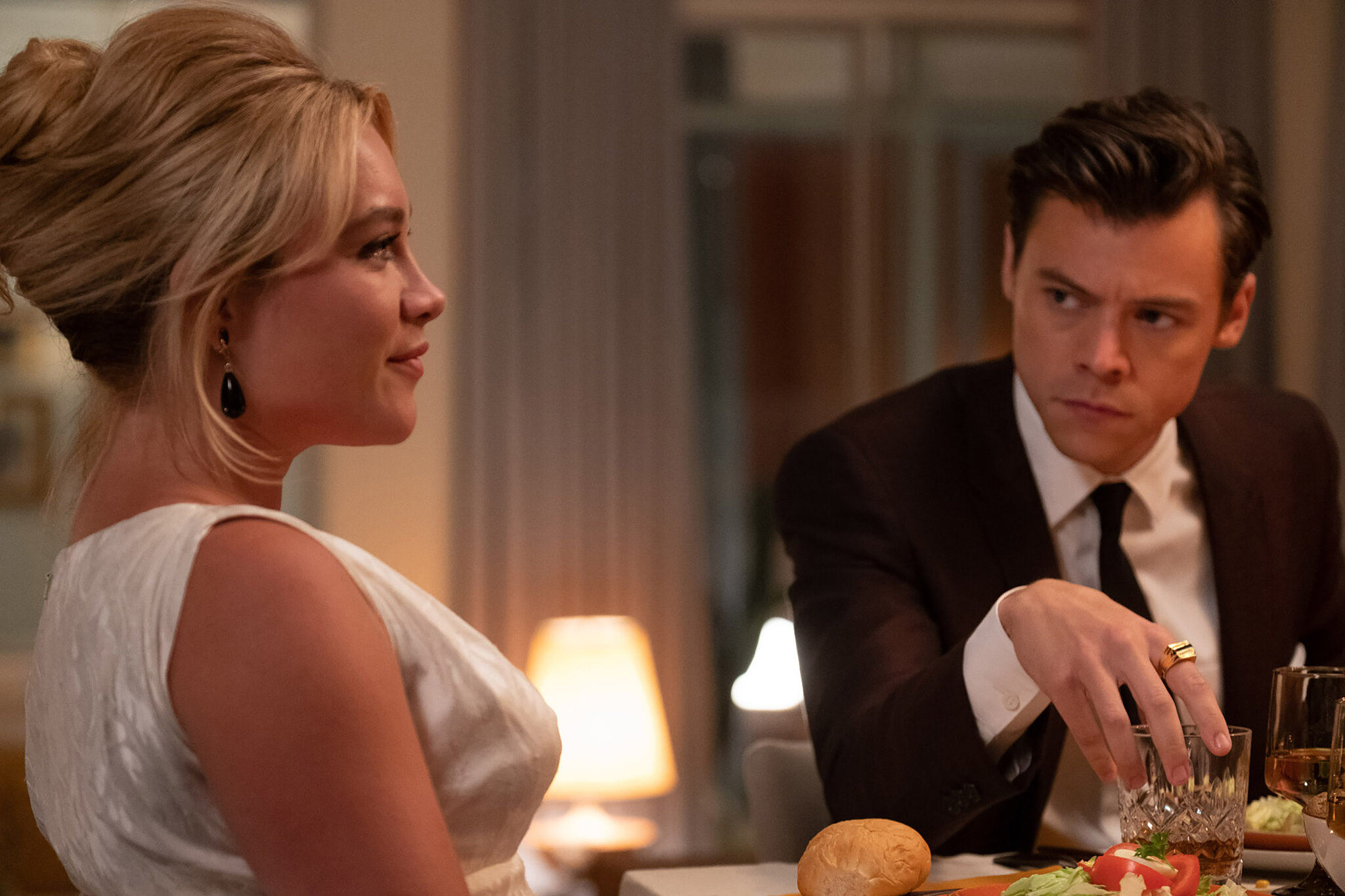Help keep The Curb independent by joining our Patreon.
Olivia Wilde’s sophomore effort, Don’t Worry Darling, has suffered a fate no filmmaker would ever wish on themselves. Many could argue the internet’s fervent obsession with behind-the-scenes drama and ego clashes between actors and the director can be a maelstrom of cheap advertising that no trailer, poster, or junket interview could beat. All eyes were on a mid-budget Hollywood film directed by a woman and starring a woman, but for all the wrong reasons. It would not surprise this writer to know that a majority of those eating up and spitting out malicious rumours, facts about people’s private lives, misleading videos, paparazzi pictures, and biased tabloid articles all about this movie and those involved had never seen Wilde’s directorial debut Booksmart, my favourite film of 2019, or were interested in seeing her directorial career move on to the next stage. Wilde and Harry Styles have said some short-sighted and immature things in several interviews, but that kind of thing has happened before and will happen again. This is a, most likely, troubled production which spiralled into a misogynistic discourse that sought to tear down whatever it could sink its teeth into. I have a sinking feeling none of this would have happened had Don’t Worry Darling been directed by a man or not released in the age of social media.
All that being said, Don’t Worry Darling is not a good movie.
Set in an idyllic and pastoral 1950s Californian company town called Victory, Alice (Florence Pugh) stays at home in her picturesque international style home while her husband Jack (Harry Styles) and all the other men of the town are away at work all day at “the Victory Project”. The town life is everything one could picture when asked to imagine 1950s America, and indeed things are happy and beautiful, even with the strict rules of never venturing outside the town’s borders and never asking their husbands to break the confidentiality of the Victory Project. Slowly and surely, Alice begins to notice things are not what they seem and tries to uncover the truth of why exactly she and all these people are here, what Victory is, and if there is even a way out.

For at least the first 45 minutes of the film, we are invested in a rather solid psychological thriller story, where Alice tries to find out why another housewife Margaret (Kiki Layne) is acting different, suddenly saying to all that there is no escape, and finally why she slits her own throat and falls off a roof while no one else seems to notice or care. Olivia Wilde builds enough interest in our principal characters and how picture-perfect this setting is to then slowly start to peel layers off and unleash some fascinating darkness underneath.
A major element that drives the distrust Alice has in her surroundings is the all-at-once charming, disarming and calculating Frank (Chris Pine), the enigmatic leader of the Victory Project, who tells us this is the life they, and by proxy us, deserve. Gemma Chan is also surprisingly sinister as Frank’s wife and companion Shelley, tearing Alice’s suspicions down as nothing more than insults. The other people around Alice (Wilde herself in a supporting role, Nick Kroll, Sydney Chandler, Kate Berlant, Asif Ali) are empty shells of friends, more than happy to indulge in a drink or several on the weekends, but when Alice dares question anything, the walls come up and soon she is made to feel insane. We are on Alice’s side, but Wilde does successfully alter her perspective with cinematography and editing to allow for spacious room for doubt. Even her husband does not listen to her suspicions, feeling more than happy to entertain her with food or sex, but nothing beyond that. There is chemistry all around here, but instead of it being an inviting playground, it develops into a chaotic prison of excess, paranoia, gaslighting, manipulation, and a sinister desire for absolute discretion.
Now, I did say the first 45 minutes.
That is a guess, but a fair one as it is about halfway through the narrative that a restlessness sets in. We have, at this point, seen perplexing visuals leading us on into endless questions about reality and the nature of this world. What is the meaning of the crashing red biplane? What is the Victory Project all about? Why do some people act like robots? What is with the red jumpsuit-wearing cleaning men? What is the giant metal gazebo-like structure atop the mountain for? How does Alice keep passing out in one location but ends up in a completely different one with no knowledge of her journey? Why is time skipping so much? What is with the empty eggs and visions of a window crushing Alice against a wall? What is the song that Alice remembers but no one else knows what she’s referring to? What’s with the black-and-white Busby Berkeley dancers? Why do her dreams picture Jack with stubble in a different location? What happened to Margaret?

We keep asking new questions with every scene that passes and it is obvious that there is an answer coming, but the confounding scenes of well-designed but rather superfluous visuals keep compounding on us as an audience until we are desperate for things to stop and explain themselves. It is okay for a film to explore ambiguous concepts, visuals, or characters without a clear answer at the centre, but Don’t Worry Darling is setting itself up, by having Alice be the only one questioning the nature of her world, to get to a revelation. This is not an avant-garde or surreal tragicomedy by David Lynch or Yorgos Lanthimos. This is a psychological thriller in the vein of Jordan Peele or M. Night Shyamalan, building to a twist ending that will provide some macabre clarity. Or so you may think.
After Jack is given a promotion within the Victory Project (and inexplicably dances in front of everyone as if it’s a rite of passage), Alice has had enough. She invites all her friends over, and Jack and Shelley, and passive-aggressively interrogates everyone into answering why all the women seem to have come from the same state and studied the same thing at school before meeting their husbands. The dinner guests leave in disgust and embarrassment, but Jack seems to go along with Alice’s worries. They get ready to leave the town, but Alice is then taken away by the red-jumpsuit men and subjected to electroshock therapy, which…somehow…sends us into a flashback into something resembling the real world. Our present world. Gone is the saturated sun-kissed aesthetic, replaced with dark trappings of a bleak hospital and a depressing apartment.
This is where it all falls apart. In the flashback, Alice is actually a surgeon working 15-hour shifts because Jack has lost his job and the couple needs to make rent. Jack resents Alice for working so much and not giving him any attention and dives into an incel-focused podcast narrated by “Frank” who is a Jordan Peterson-type figure. The world that Alice has been living through is actually a simulation that Frank and his followers with the “Victory Project” have created in the real world to subjugate the wives and girlfriends of the Project’s followers and return to a “natural order” of patriarchy.
Alice returns to Victory, aware of what is really going on, and confronts Jack, who explains his reasoning, saying he wanted them to be happier together, before trying to suffocate Alice, who then fights back by caving in his skull with a whiskey bottle. Alice’s friend Bunny (Olivia Wilde) arrives to help her, saying she always knew about the simulation and chose this life because here her children are actually alive. Alice escapes via Jack’s car, after standing in the street as alarms blare with no urgency to get the hell out of there, and arrives at the mountaintop, realising the glass dome gazebo thing is actually the way out of the simulation, and finally escapes her confines as we cut to black.
I understand what Don’t Worry Darling is going for, but it does not succeed in its attempts. Initially, there is this feeling that the film is going to be a critique of planned communities and company towns similar to the plans of Walt Disney’s EPCOT, or the evils of capitalism on a susceptible mindset, or of cult leaders of which there were hundreds in post-war America. It is more of a criticism of toxic masculinity, the patriarchy in general, the incel community, and the dangers of social media on the socially or emotionally illiterate. None of these are all that unique and all pale in comparison to other works that touch upon the same ideas better. Even the eventual science-fiction twist to it all can’t help but ape better stories like The Truman Show or The Stepford Wives. It is never a film that stands on its own merits, borrowing heavily from others and passing it off as something new or groundbreaking.
Visually, the film is splendid. Cinematographer Matthew Libatique bathes the frame in a sumptuous golden light and high-contrast that makes even a shot of sand look picturesque. Katie Byron’s production design is exemplary, perfectly matching the real shooting location of the Kaufmann house with every home and every street. Performance-wise, the film belongs to Florence Pugh who crafts an elegant and dedicated performance that rises above any confusing story at hand, remaining one of our very finest working actresses. Chris Pine plays his role as Frank with an air of sexual magnetism mixed with a cutting psychological manipulation, unconsciously letting you agree with him as if you’ve always believed his version of the truth, and Gemma Chan and Olivia Wilde have their share of fine moments. Kiki Layne also does a lot with surprisingly little (seeing as most of her scenes were apparently cut from the final film). But much talk has been made about Harry Styles, and he is…fine. Just…fine. He, despite being the leading man, never stands out, never makes a distinguished presence, and completely fades into the background of more talented co-stars even when he’s trying he’s best. It is not the worst of “musicians turned actors” (see also Glitter, all of Elvis Presley’s movies etc.) but it would be folly to argue anything beyond “mid”.
I am rather disappointed with what Don’t Worry Darling became, seeing as I have mentioned before that Booksmart was my favourite film of 2019, and I saw much promise in what Olivia Wilde could do with a darker thriller-type movie. Her direction is disastrously inconsistent, with most of the questions I mentioned going completely unanswered and the sudden flashback being an unwarranted change in perspective that breaks the story we’ve already started to understand. The result is a bloated mess of half-baked ideas, rendered with pretty but ultimately meaningless visuals, and all wrapped up in a twist so unintentionally hilarious (the sight of Pugh’s eyes held open with laser devices alone) one wouldn’t be mistaken in thinking this was a lost Shyamalan script from the dark days of 2008. One can respect what it wanted to do, but Don’t Worry Darling as beautiful as it looks and with some terrific performances at hand, led by the magnificent Florence Pugh, is nothing more than a shallow reach for resonance when all it can muster is a limp, dull grasp.
Director: Olivia Wilde
Writer: Katie Silberman (story by Carey Van Dyke, Shane Van Dyke, and Katie Silberman)
Starring: Florence Pugh, Harry Styles, Olivia Wilde, Gemma Chan, Kiki Layne, Nick Kroll, and Chris Pine



